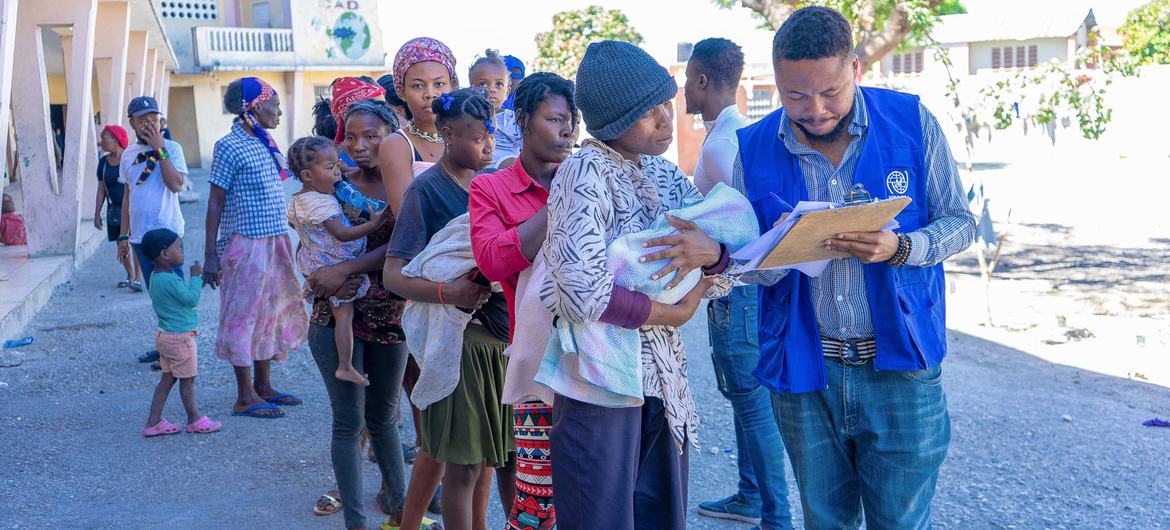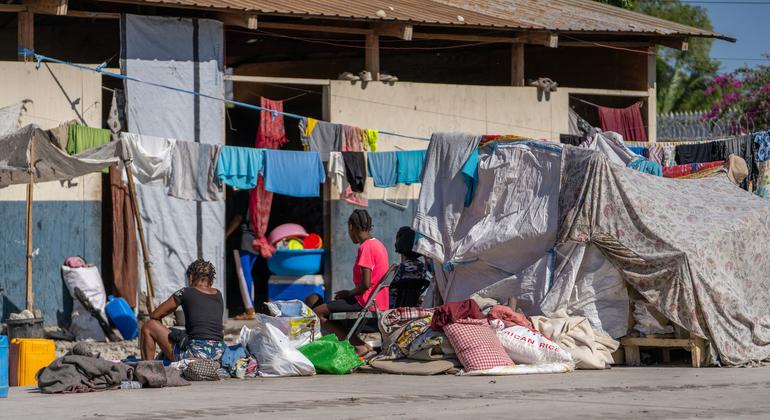Council members urged the armed gangs to “immediately cease their destabilizing actions” and reiterated the call for the “perpetrators of these abhorrent acts to be brought to justice”, according to a statement issued following a closed-door briefing last week by the Secretary-General’s Special Representative and Head of the UN Integrated Office in Haiti (BINUH).
In the statement, the 15-member Council reiterated its strong condemnation of the increasing violence, criminal activities, mass displacement of civilians and human rights abuses that undermine the peace, stability and security of Haiti and the region.
That includes kidnappings, sexual and gender-based violence, unlawful killings and the recruitment of children by armed groups and criminal networks, Council members said.
Calls to choke illicit arms flows
Expressing grave concern at the illicit flow of arms and ammunition to Haiti that remains a “key factor of instability and violence”, the Security Council called on Member States to implement existing arms embargoes.
Ambassadors condemned “in the strongest terms” attacks carried out by armed gangs on the country’s main prisons and other critical infrastructure, which allowed gang leaders and other prisoners to escape the facilities, and expressed their deep concern at unacceptable threats of targeted violence against the police and members of the government.
They also expressed expectation and hope that the Council-mandated multinational support mission, created upon the request of the Haitian Government to address the ongoing crisis, would be deployed “as soon as possible”.
Capital ‘under siege’
The chaotic security situation is growing ever more dangerous, according to Philippe Branchat, the UN International Organization for Migration (IOM) chief in Haiti.
“The capital [Port-au-Prince] is surrounded by armed groups and danger; it is a city under siege,” he stressed.
Right now, more than 160,000 people are currently displaced in the Port-au-Prince metropolitan area, as the UN migration agency raised concerns about the aftermath of the gang-driven surge in violence which began in late February.
“People living in the capital are locked in; they have nowhere to go,” he warned.
Looting aid containers
Looting at the main port, where the overwhelming majority of goods and products are transported, has put 300 containers of lifesaving aid at risk, the UN humanitarian office, OCHA, stated in its latest situation report.
The agency stated that an “unspecified number of containers of food and non-food articles were broken into” and that efforts are being undertaken to protect humanitarian supplies.
Terminal Varreux, where the majority of the fuel in country is stocked, has been “blocked by gangs”, raising concerns of looming fuel shortages, OCHA reported.
Insecurity ripples across nation
Since gang violence broke out on 29 February across numerous neighborhoods in the capital, a heavy gunfight led to two jail breaks, releasing about 4,500 prisoners and throwing Port-au-Prince into more insecurity.
At the time, a three-day-long state of emergency was extended until 3 April. Meanwhile, Prime Minister Ariel Henry remains outside Haiti, in Puerto Rico, after his plane was denied the right to land last week at the besieged national airport. According to media reports, gang leaders have threatened civil war if he does return to the capital.
The spike in violence has already disrupted economic activities across the capital, according to OCHA. All commercial airlines have suspended flights to Port-au-Prince, and neighbouring Dominican Republic has closed its airspace to all flights to and from Haiti effective 5 March.
Violence empties displacement camps
IOM raised concerns about reports of violence in Artibonite, roadblocks in Cap Haitien and fuel shortages in the south.
“Haitians are unable to lead a decent life; they are living in fear, and every day, every hour this situation carries on, the trauma gets worse,” Mr. Branchat warned.
Ten displacement sites have been emptied due to the “successive waves of violence”, leaving displaced families traumatised, IOM reported, as needs soar.
“Urgent needs include access to food, healthcare, water, and hygiene facilities, and psychological support,” the agency said.
Hospitals seized
The collapsing health system, attacks on hospitals by the armed groups and the lack of mental health services further exacerbate the humanitarian crisis, IOM cautioned.
“Some hospitals have been overrun by gangs and had to evacuate staff and patients, including newborns,” the agency said, adding that medical professionals across the capital are “sounding the alarm” as their capacity to deliver has been “severely diminished”.
Among the most basic services at risk, there is a “dire” need for psychosocial support, IOM reported.
That is because of increasingly grave conditions, the agency said, pointing to people facing successive displacements coupled with violence, rape and overcrowding in shelters.
These conditions have exacerbated psychological distress with an alarming rise in suicidal tendencies among the displaced, IOM stated.

More than 160,000 people are currently displaced in Haiti’s Port-au-Prince metropolitan area.
Emergency response
Across Haiti, 362,000 people – more than half of them children – are currently internally displaced, some of them several times over, representing a 15 per cent increase since the beginning of the year, UN agencies reported.
A lack of goods and resources is amplifying an already precarious economic situation, IOM said, as each new location presents new adaptation challenges, such as access to water and basic services.
Despite the chaotic security situation in the capital, IOM and its partners persist in delivering assistance to the areas where it is most needed.
“The agency is using every available opportunity to provide aid to communities and displaced populations in different neighborhoods and maintaining the necessary social cohesion between both communities facing similar humanitarian needs,” IOM stated.
Aid agencies urgently ‘need access’
OCHA is leading coordination efforts in close collaboration with civil protection authorities to ensure that aid workers can deliver.
The UN World Food Programme (WFP) was able to deliver almost 19,000 meals in a 48-hour period last week.
IOM and its partners have provided nearly 300,000 litres of water to more than 20,000 displaced people. They also distributed blankets, jerry cans, solar lamps, kitchen sets and plastic sheets to more than 2,000 people and are offering psychosocial support through hotlines and mobile clinics with psychologists, nurses and doctors.
However, greater access is urgently needed, IOM said.
“IOM and humanitarian partners need unhindered access throughout the country to ensure that lifesaving aid reaches the most vulnerable people now,” the UN migration agency said.



